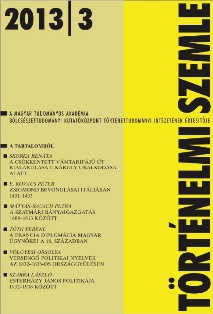Ősi alkotmány és törvényhozói szabadság. Versengő politikai nyelvek a polgári törvények vitájában az 1832–1836-os országgyűlésen
Ancient Constitution and the Freedom of Lawmaking. Competing Political Languages in the Debate of Civic Laws at the Hungarian Parliament of 1832–1836
Author(s): Orsolya VölgyesiSubject(s): History
Published by: Magyar Tudományos Akadémia Bölcsészettudományi Kutatóközpont Történettudományi Intézet
Summary/Abstract: The study analyses the discussions in a given section of the Hungarian parliament of 1832– 1836 from the point of view of what political languages and sets of argument were used by the opposing parties in setting forth their respective opinions. It focusses on the extent to which the reformist opposition which entered the stage at the parliament of 1832–1836 managed to transform the public language of politics, and on the political dictionary and conceptual stock which were available as the means for discussion. The most important lessons are demonstrated in the study through the activities of Ferenc Kölcsey (delegate from Szatmár county, and one of the outstanding poets of the age). As notary-in-chief of his county, Kölcsey took a role in drafting the instructions for the county envoys, which makes it possible to trace the modifications of his personal opinion under the infl uence of the parliamentary debates, and the means by which he proved able to infl uence the process of the debates himself according to his own instructions. The primary task of the diet which was convoked for 16 December 1832 was the discussion, long desired by the public opinion, of the results of the so-called systematic committee works (Lat. operata). These committee works, which covered nine different areas, mainly aimed at modernising the economic and legal conditions of the country, transforming certain elements of the constitutional system, re-regulating and enacting the seigneurial dues of tenants once fixed by Queen Maria Theresia, and revising the affairs of education, the church and foundational matters. It was precisely with the help of the committee propositions that the estates tried at the parliament of 1832–1836 to narrow the scope of royal prerogatives (the so-caled reservata), and to draw them into the competence of the bipolar legislature, to be exerted, on the model of corporative dualism, together with the ruler. Th ese prerogatives would consequently have been inserted into the mutual bargaining process referred to as diaetalis tractatus, thus widening the limits set by the „ancient constitution”. The present study examines in detail the discussion of the civic laws, which made part of the legal committee on the second place among the royal propositions, for it was this draft law which aimed at reregulating the complicated system of Hungarian common law, and the modification of which was almost always directly connected to the problem of free disposition of property, and to the issue of the so-called ősiség, and indirectly or indirectly to the „ancient constitution” itself. While presenting the more important nodal points of the discussions, the study concentrates on the ways in which the opposing parties applied the various political languages and techniques of argumentation in order to achieve the desired goals, from the references to the essence and original spirit of the „ancient
Journal: Történelmi Szemle
- Issue Year: 2013
- Issue No: 03
- Page Range: 401-424
- Page Count: 24
- Language: Hungarian

